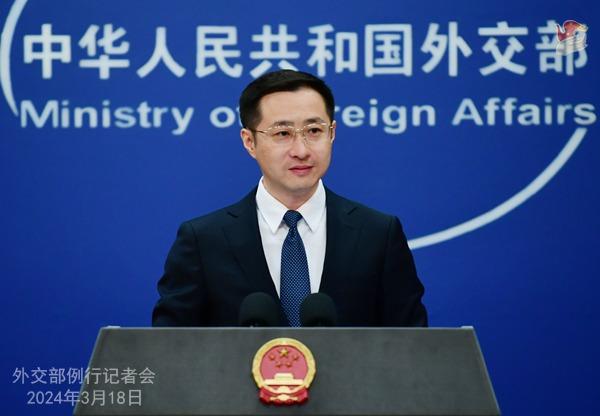 Lin Jian, spokesman for China's Foreign Ministry, speaks at a press conference in Beijing on March 18, 2024. (PHOTO / FOREIGN MINISTRY, CHINA)
Lin Jian, spokesman for China's Foreign Ministry, speaks at a press conference in Beijing on March 18, 2024. (PHOTO / FOREIGN MINISTRY, CHINA)
The Chinese Foreign Ministry reiterated its opposition on Monday to defining the relationship between China and the United States as competitive, and rejected Washington's restriction of Beijing's legitimate development rights based on the excuse of competition.
Lin Jian, the ministry's new spokesman, made the remarks in response to recent comments on bilateral ties made by US Ambassador to China Nicholas Burns.
The relationship between the US and China remains highly competitive, and the two sides will very likely be "systemic rivals" well into the next decade, Burns told a virtual seminar on Friday.
Lin Jian said Beijing opposes the US' smears and attacks against China, and its interference in the country's internal affairs under the pretext of human rights and values
Burns also said that the US is strengthening strategically, militarily and economically in the "Indo-Pacific" region, and expressed concerns over Hong Kong's legislation under Article 23 of the Basic Law.
READ MORE: Beijing: US is true breeding ground of disinformation
Burns has repeatedly made negative remarks on China, and such remarks deviated from the important consensus reached by the two heads of state at the San Francisco summit and go against the spirit of the summit, which will not help with stabilizing bilateral relations, Lin told a daily news conference.
It is not the right way for the two countries to develop sound and stable ties or get along with each other, he added.
Lin stressed that China-US relations should not be a zero-sum game where one side outcompetes or thrives at the expense of the other.
ALSO READ: US urged to stop interfering in HK's Article 23 legislation
Beijing opposes the US' smears and attacks against China, and its interference in the country's internal affairs under the pretext of human rights and values, he said.
He added that he hopes the US will work with China in the same direction to push forward the stable, healthy and sustainable development of bilateral ties.


